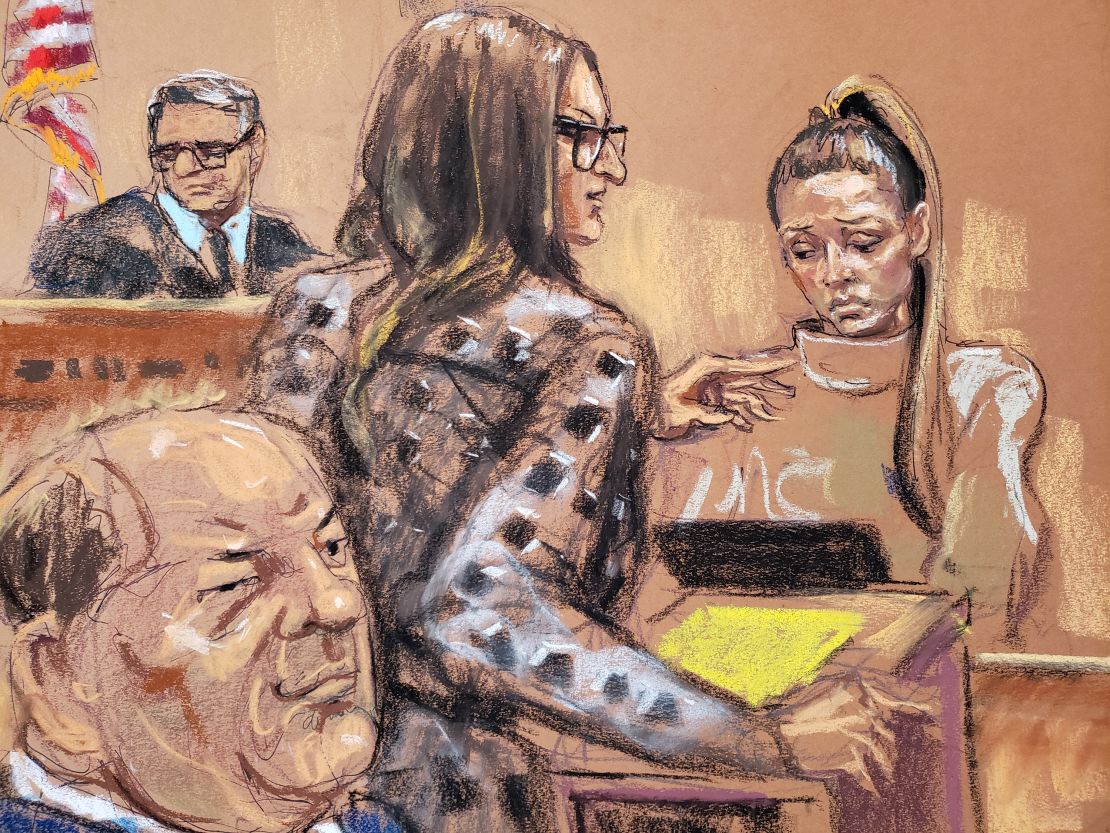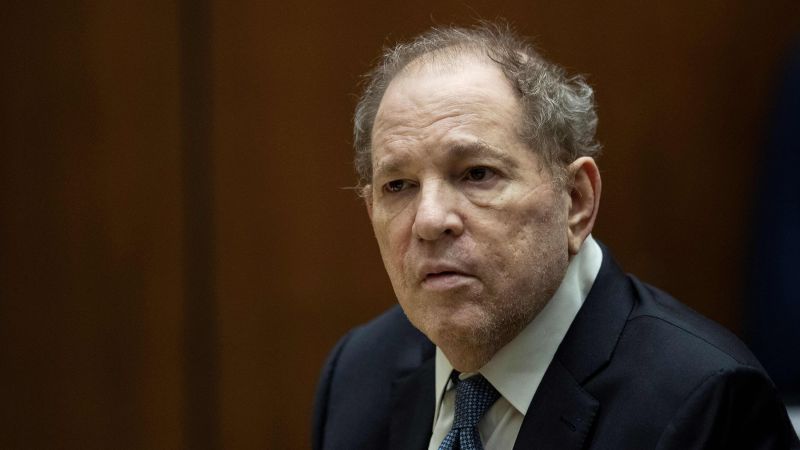CNN
—
The New York Court of Appeals on Thursday overturned the sex crimes conviction against Harvey Weinstein, the powerful Hollywood producer whose downfall stood as a symbol of the #MeToo movement, and ordered a new trial.
The court, by a 4-3 vote, ruled the testimony of “prior bad acts” witnesses should not have been allowed because it “was unnecessary to establish defendant’s intent and served only to establish defendant’s propensity to commit the crimes charged.”
Weinstein, 72, was convicted in 2020 of first-degree criminal sexual act and third-degree rape, and he was sentenced to 23 years in prison. He has maintained his innocence and denied any nonconsensual sexual activity.
The Manhattan District Attorney’s Office said it plans to retry the case.
“We will do everything in our power to retry this case, and remain steadfast in our commitment to survivors of sexual assault,” said Emily Tuttle, deputy director of communications and senior advisor for the office.
Weinstein is being held at Mohawk Correctional Facility in Rome, New York, according to the state Department of Corrections and Community Supervision. The department said it is reviewing the appeals court’s decision.
Weinstein will soon be taken from the correctional facility to Manhattan court and his trial will start anew, with a new judge and prosecutor, defense attorney Arthur Aidala said in a news conference.
He is unlikely to be released because he was sentenced last year in Los Angeles to 16 years in prison for charges of rape and sexual assault. That trial similarly used “prior bad acts” witnesses and has also been appealed.
Thursday’s ruling comes more than six years after reporting by The New York Times and The New Yorker in 2017 revealed Weinstein’s alleged history of sexual abuse, harassment and secret settlements as he used his influence as a Hollywood power broker to take advantage of young women.
At the time, Weinstein was one of the most powerful men in Hollywood and helped produce movies such as “Pulp Fiction,” “Clerks” and “Shakespeare in Love.” The revelations led to a wave of women speaking publicly about the pervasiveness of sexual abuse and harassment in what became known as the #MeToo movement.
Yet, #MeToo has had mixed success in the courtroom, and this is the second high-profile case to be overturned on appeal. The comedian Bill Cosby was convicted in 2018 of drugging and sexually assaulting a woman, but a Pennsylvania appeals court overturned the conviction in 2021, saying his due process rights were violated.
The ruling overturning Weinstein’s conviction led to a range of reactions from those involved with the case.
Upon hearing the news, Weinstein “heaped praise” on his legal team and was “very gracious” and “very grateful,” Aidala said.
“The witnesses were there just to make Harvey Weinstein look bad,” Aidala said. “That’s the only reason why those witnesses were admitted. To show that he’s a bad guy. He was tried on his character, not the evidence.”
“Justice was served,” said Donna Rotunno, the lead defense attorney at Weinstein’s trial in New York. “I believe this decision is larger than Harvey Weinstein. Courts cannot operate on emotion and lack of due process. The world is off-balance, and when the justice system does not work, nothing does. This decision restores faith in the foundation of our system.”
“We are cautiously excited and need to study the ramifications of the appeal decision,” Weinstein’s spokesperson Juda Engelmayer said. “We always said this was an unjust trial.”
Former Manhattan District Attorney Cyrus Vance Jr., who brought the charges against Weinstein, said he was “shocked” by the decision.
“I am deeply grateful to and humbled by the survivors who came forward in the brightest glare of a public courtroom to tell their stories at great personal cost and trauma,” Vance said in a statement. “The judicial system, in my opinion, has let them down today and did not advance justice. “
Dawn Dunning, one of the “prior bad acts” witnesses in Weinstein’s trial, said in a statement she did not regret testifying and urged the district attorney’s office to retry the case.
“While I’m stunned that the court threw out Weinstein’s conviction on legal technicalities, I am still proud that I testified and confronted that convicted rapist,” she said. “I came forward to support other women who were also sexually abused by Weinstein and to ensure that he would be held accountable.”
Miriam “Mimi” Haley, whose testimony made up the first-degree criminal sexual act charge, “would consider testifying again” in a potential retrial, her attorney Gloria Allred said in a statement.
“Even though the process of testifying was grueling and retraumatizing for Mimi, she reaffirmed to me today that she would consider testifying again if (Manhattan) District Attorney Alvin Bragg decided to proceed with a new trial of Harvey Weinstein,” she said. “I commend Mimi on her courage and willingness to keep standing up for the truth.”
Douglas H. Wigdor, an attorney who has represented eight of Weinstein’s accusers, including two of the “prior bad acts” witnesses at his New York criminal trial, also criticized the decision.
“Today’s decision is a major step back in holding those accountable for acts of sexual violence,” he said in a statement. “Courts routinely admit evidence of other uncharged acts where they assist juries in understanding issues concerning the intent, modus operandi or scheme of the defendant. The jury was instructed on the relevance of this testimony and overturning the verdict is tragic in that it will require the victims to endure yet another trial.”

The New York charges were directly based on the testimony of Haley and Jessica Mann. Haley testified that Weinstein forcibly performed oral sex on her in 2006 at his Manhattan apartment, and Mann testified that he raped her in 2013 during what she described as an abusive relationship.
In addition, three other women testified during the trial as “prior bad acts” witnesses as prosecutors sought to show Weinstein had a pattern of abuse. These women – Dunning, Tarale Wulff and Lauren Young – each said Weinstein used his Hollywood influence to take advantage of them when they were young and hoping to break into the film industry.
After Weinstein was convicted in his New York trial, his attorneys appealed the verdict. They argued the judge should not have allowed these “prior bad acts” witnesses to testify and should not have given prosecutors the ability to question Weinstein about instances of verbal abuse and bullying on cross-examination. (Weinstein ultimately did not testify in the case.)
The Court of Appeals agreed with the defense on those points.
“We conclude that the trial court erroneously admitted testimony of uncharged, alleged prior sexual acts against persons other than the complainants of the underlying crimes because that testimony served no material non-propensity purpose,” the ruling, written by Judge Jenny Rivera, states.
“The court compounded that error when it ruled that defendant, who had no criminal history, could be cross examined about those allegations as well as numerous allegations of misconduct that portrayed defendant in a highly prejudicial light. The synergistic effect of these errors was not harmless.”
Yet in a stinging dissent, Judge Madeline Singas wrote that the majority opinion “perpetuates outdated notions of sexual violence and allows predators to escape accountability.”
“This conclusion deprives juries of the context necessary to do their work, forecloses the prosecution from using an essential tool to prove intent, ignores the nuances of how sexual violence is perpetrated and perceived, and demonstrates the majority’s utter lack of understanding of the dynamics of sexual assault,” Singas wrote. “Because New York’s women deserve better, I dissent.”
The use of “prior bad acts” witnesses has increased in recent years with the rise of the #MeToo movement. In sexual assault cases, their testimony can turn a difficult “he said, she said” case into a more convincing “he said, they said” case.
In general, evidence that the defendant has poor character or has done bad things in the past is not allowed during a trial. The fear is that the jury will be overly influenced by these prior incidents and may ignore the actual evidence of the alleged crime.
“Prior bad acts” evidence is one exception to this rule. It can be used to prove the defendant’s “motive, opportunity, intent, preparation, plan, knowledge, identity, absence of mistake, or lack of accident,” according to federal evidence rules.
Judges have a fair amount of discretion to decide what is and what isn’t allowed in court as they try to balance the relevance of the testimony against the prejudice to the jury.
This story has been updated with additional information.
